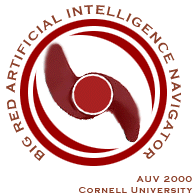
 |
|
 |
| The Cornell Big Red Artificial
Intelligence Navigator (BRAIN) team won second place at the third annual
International Autonomous Underwater Vehicle Competition held at Lago Dorado,
on the grounds of Disney's Coronado Springs resort in Orlando, Florida.
Cornell's submarine took first place in the Safety of Design, Technical
Merit, and Craftsmanship categories, and tied for second place overall with
the competition favorite and two-time defending winner, MIT. This is the
first year Cornell students have participated in the event. Started by sophomores Serguei Vassilvitskii, Nidhi Kalra, Jack Chuang, and Walter Chang in September of 1999, and advised by Professor Kevin Kornegay of Electrical Engineering, the BRAIN team is Cornell's newest systems engineering project, providing students with an opportunity to apply the knowledge learned in classroom studies. This year's team consisted of 42 students, with the majority coming from computer science, electrical engineering, and mechanical engineering. Also represented were engineering physics, operations research and engineering, and the College of Arts and Sciences. The competition, sponsored by the Office of Naval Research and the Association for Unmanned Vehicle Systems International, is in its third year and is rapidly growing, with 12 teams entering in 2000. Although many of the teams, including MIT, University of Florida, and University of Rhode Island receive technical support from local oceanography and robotics centers, all work is completed by the student members of the teams. This goal of this years competition was to locate and retrieve an orange ring (12 inches in diameter) from a murky lake (350 feet in diameter). A flashing light and an acoustic pinger were placed next to the target and served as navigational guides to the ring. Points were also awarded for gathering aural and visual information about the beacons. The main challenge of the competition was to perform the task completely autonomously, without any communication between the submarine and any person or computer on shore once the vessel entered the water. None of the teams retrieved the ring. Cornell's team experienced technical difficulties stemming in part from central Florida's extreme heat and humidity but was nonetheless able to complete a fully autonomous run. The sub hovered directly over the target and recorded information from the beacon but was unable to pick up the ring. Having won first place in static judging for Craftsmanship, Technical Merit, and Safety of Design, the Cornell team earned enough points with the autonomous run to tie for second place with two-time winner MIT. Both teams were edged out by the University of Rhode Island, whose submarine came closest to the marker. "This has been an incredible trip,'"said the team captain, Serguei Vassilvitskii. "What we have learned surpasses anything that could have been taught to us in the classroom.'" "We are already considering improvements to this year's design and we hope to position ourselves to win next year," added team member Brian Dunstan. |